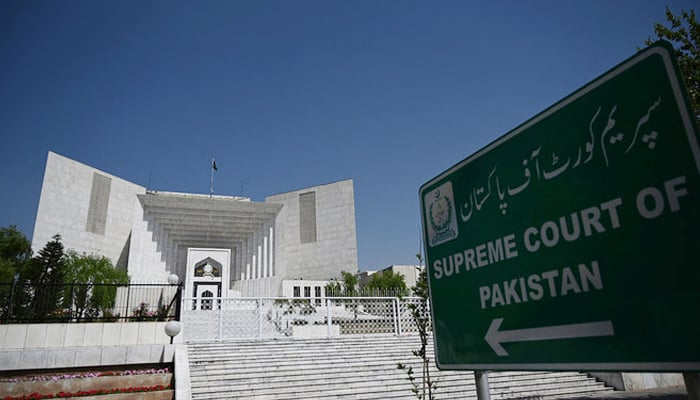SC issues detailed judgement in lifetime disqualification case
23-page detailed judgement authored by Justice Isa held that that the decision in the case of Sami Ullah Baloch does not conform to the Constitution
ISLAMABAD: The Supreme Court has reversed the lifetime disqualification of lawmakers and held that parliament has enacted Section 232(2) in the Elections Act, stipulating that disqualification under Article 62(1)(f) cannot exceed five years. A seven-member bench of the apex court, headed by Chief Justice Qazi Faez Isa, issued a detailed judgement in scores of appeals filed by lawmakers, challenging their lifetime disqualification in view of Samiullah Baloch case. Other members of the bench were Justice Syed Mansoor Ali Shah, Justice Yahya Afridi, Justice Aminuddin Khan, Justice Jamal Khan Mandokhail, Justice Muhammad Ali Mazhar, and Justice Musarrat Hilali.
The bench on January 8, 2024 had abolished lifetime disqualification of parliamentarians, paving the way for former prime minister Nawaz Sharif and Istehkam-i- Pakistan former chief Jehangir Tarin to contest the general elections held on February 8. The bench by a majority of 6 to 1 (Yahya Afridi dissenting), had declared that Article 62(1)(f) of the Constitution is not a self-executory provision as it does not by itself specify the court of law that is to make the declaration nor does it provide for any procedure for making, and any period for disqualification, such declaration.
Justice Yahya Afridi, while disagreeing with the majority judgement, had held that the extent of lack of qualification of a member of parliament, as envisaged under Article 62(1)(f) of the Constitution is neither lifelong nor permanent, and the same shall remain effective only during the period the declaration so made by a court of law remains in force. “Therefore, the conclusion so drawn by this Court in Sami Ullah Baloch Versus Abdul Karim Nousherwani (PLD 2018 SC 405) is legally valid, hence affirmed,” Justice Afridi had held.
The 23-page detailed judgement authored by Justice Isa held that that the decision in the case of Sami Ullah Baloch does not conform to the Constitution and overrule it. “The determination in the case of Sami Ullah Baloch and in all those cases in which the returning officers, election tribunals, the High Courts and this Court had issued declarations pursuant to Article 62(1)(f) of the Constitution and held such disqualification to be permanent are not sustainable,” the detailed verdict held.
The court held that parliament has enacted Section 232(2) in the Elections Act, stipulating that disqualification under Article 62(1)(f) cannot exceed five years, and there is no need to examine its validity in the present case. The court noted that the Supreme Court had decided the case of Sami Ullah Baloch on 13 April 2018, which was before the enactment of section 232(2) which came into effect on 23 June 2022.
“In Sami Ullah Baloch it was decided that a person disqualified under Article 62(1)(f) of the Constitution would not be able to contest elections,” said the verdict.
The court held that parliamentarians had deliberated and understood that by adding the caveat they had preserved the emotiveness of the words (inserted by General Zia-ul-Haq) in Article 62(1)(f) – “sagacious, righteous and non-profligate and honest and amen” – while rendering these words inconsequential, particularly when neither the procedure nor any court was conferred with jurisdiction to issue such a declaration.
“Therefore, since disqualification under Article 62(1)(f) of the Constitution was rendered an impossibility, parliament did not consider the necessity to stipulate the duration of the disqualification,” the detailed verdict noted. The court noted that Article 8(2) of the Constitution provides that the State shall not make any law which takes away or abridges the rights conferred by or recognised as fundamental rights, adding that the fundamental right incorporated in Article 17(2) entitles a citizen to “form or be a member of a political party”.
-
 Super Bowl 2026 Live: Seahawks Lead Patriots 3-0 After Defensive First Quarter
Super Bowl 2026 Live: Seahawks Lead Patriots 3-0 After Defensive First Quarter -
 Bad Bunny's Super Bowl Halftime Show: What Time Will He Perform Tonight?
Bad Bunny's Super Bowl Halftime Show: What Time Will He Perform Tonight? -
 Where Is Super Bowl 2026 Taking Place? Everything To Know About The NFL Showdown
Where Is Super Bowl 2026 Taking Place? Everything To Know About The NFL Showdown -
 Drake 'turns Down' Chance To Hit Back At Kendrick Lamar At Super Bowl
Drake 'turns Down' Chance To Hit Back At Kendrick Lamar At Super Bowl -
 Sarah Ferguson Had A ‘psychosexual Network’ With Jeffrey Epstein
Sarah Ferguson Had A ‘psychosexual Network’ With Jeffrey Epstein -
 Czech Republic Supports Social Media Ban For Under-15
Czech Republic Supports Social Media Ban For Under-15 -
 Khloe Kardashian Shares How She And Her Sisters Handle Money Between Themselves
Khloe Kardashian Shares How She And Her Sisters Handle Money Between Themselves -
 Prince William Ready To End 'shielding' Of ‘disgraced’ Andrew Amid Epstein Scandal
Prince William Ready To End 'shielding' Of ‘disgraced’ Andrew Amid Epstein Scandal -
 Chris Hemsworth Hailed By Halle Berry For Sweet Gesture
Chris Hemsworth Hailed By Halle Berry For Sweet Gesture -
 Blac Chyna Reveals Her New Approach To Love, Healing After Recent Heartbreak
Blac Chyna Reveals Her New Approach To Love, Healing After Recent Heartbreak -
 Royal Family's Approach To Deal With Andrew Finally Revealed
Royal Family's Approach To Deal With Andrew Finally Revealed -
 Super Bowl Weekend Deals Blow To 'Melania' Documentary's Box Office
Super Bowl Weekend Deals Blow To 'Melania' Documentary's Box Office -
 Meghan Markle Shares Glitzy Clips From Fifteen Percent Pledge Gala
Meghan Markle Shares Glitzy Clips From Fifteen Percent Pledge Gala -
 Melissa Jon Hart Explains Rare Reason Behind Not Revisting Old Roles
Melissa Jon Hart Explains Rare Reason Behind Not Revisting Old Roles -
 Meghan Markle Eyeing On ‘Queen’ As Ultimate Goal
Meghan Markle Eyeing On ‘Queen’ As Ultimate Goal -
 Japan Elects Takaichi As First Woman Prime Minister After Sweeping Vote
Japan Elects Takaichi As First Woman Prime Minister After Sweeping Vote




